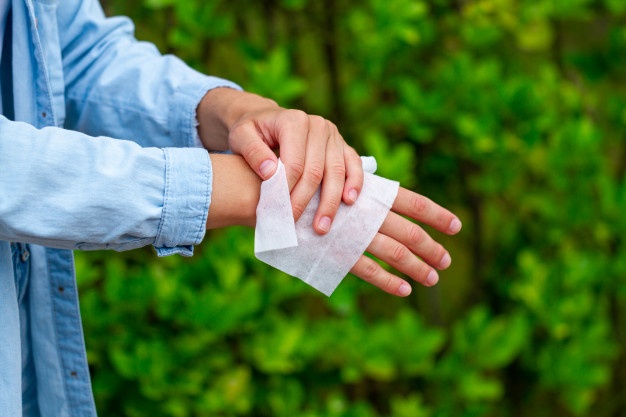We are used to getting ready for the cold and flu season by taking preventative measures such as receiving the flu shot and doing the best we can to decrease our exposure to germs. Now, with COVID-19, also referred to “the coronavirus”, many of us started to take extra precautions to keep ourselves as much germ-free as possible.

When it comes to protecting ourselves against picking up bacteria and viruses, being mindful of your surroundings and what you do is the rule to follow. This means considering everything you touch to be something that could potentially transmit a bacteria or virus to you. Infectious disease specialists say that although we can’t protect ourselves against every single germ out there, we can be conscious of what we come in contact with, particularly when exposed to people in crowds, on the streets and in the stores. Here are some expert tips to stay as germ- and bacteria-free as possible.

Wash Your Hands

One of the easiest ways you can catch and spread germs is when you touch something with germs already on it, like a handrail or doorknob, and then touch your eyes, nose or mouth. Washing your hands frequently is one of the most effective ways to keep germs at bay. Always wash your hands before preparing food, after using the restroom and every time you step through your front door. Whether you’ve just returned from work or the supermarket, it’s important to wash away the germs you’ve most likely picked up in these public locations.
Use Antibacterial Wet Wipes in Between Washes
Are antibacterial wipes effective against viruses and bacteria? Well, while experts will tell you that hand-washing is more effective for ridding yourself of germs than hand sanitizer, they will also tell you that using sanitizer is better than nothing. But it’s important to know how to sanitize the right way. Otherwise, you won’t be killing any germs, which could give you a false sense of security about how germ-free you really are.

For effective sanitising, it’s important to know what are antibacterial wipes made of. Antibacterial wipes are soaked with chemicals that destroy almost any type of germ, including the virus that causes COVID-19. However, killing those germs requires exposing them to these chemicals for at least 30 seconds, or up to a minute if you want to be 100% safe. This means, if you grab a wipe and swipe your hand quickly, the cleaning solution is going to evaporate within seconds and that is not enough time to kill any germs. To use antibacterial wet wipes correctly, you should go slowly and make sure your hands remain damp for the length of time required to kill germs.
Since different products use different types of chemicals, read the instructions on the label to know the exact duration of time it takes for these chemicals to work.
Keep Your Home and Workplace Clean

Regular cleaning is the best way to keep germs at bay in the household. Rather than waiting to do all your cleaning once a week or every other week, do a little bit each day. Break it down by dedicating a different room to each day of the week. For example, you can clean the bathrooms on Monday and do a deep clean of your kitchen on Tuesdays. This is a convenient way to help you keep up with your housework.
If you work in an office setting, be conscious to disinfect your desk, mouse, computer and phone every single day. And do your best to avoid co-workers who are exhibiting symptoms of illness.
Don’t Share Personal Items
Research has shown that germs can remain on surfaces of common objects, like utensils and straws, for hours. Touching something with germs already on it can lead you to pick up and spread those germs.

So, don’t share items that can come in contact with saliva or other bodily fluids. This applies especially for respiratory equipment like nebulizers and airway clearance devices. If you have cystic fibrosis (CF), you should have you own nebulizer and airway clearance device.
Keep a Safe 2 Meters Distance

Germs can spread as far as 2 meters through droplets released in the air when you cough or sneeze. Stay at least 2 metres away from others with cystitis fibrosis and anyone with a cold, flu or infection in all environments, both outdoors and indoors. Try to avoid activities that may put you in close contact with anyone who is sick. Some examples of activities to avoid include shaking hands, hugging or kissing, sharing car rides, taking the same fitness classes, etc.
Boost Your Immune System
Get enough sleep, exercise and take appropriate vitamins through a balanced diet or supplements if you have a particular deficiency. Vitamin C is a great ally to help support a healthy immune system. Vitamin C has been proven to shorten the life of colds, protect the body against infection, protect the cells from damage and more. Try taking a Vitamin C immune support tablet to boost your daily immune system.

Vitamin D also helps the immune system stay balanced during cold and flu season. It is known to increase immune cell function, lining your lungs to fight off viruses. Consider spending time in the sunlight or taking a supplement to increase your levels of Vitamin D.


